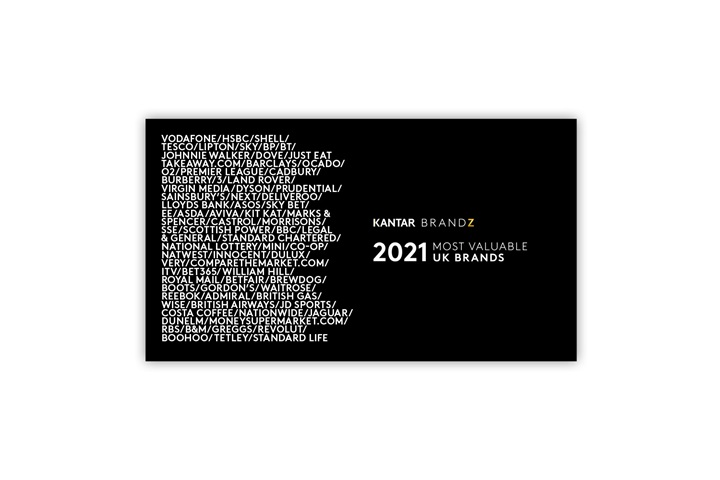The UK’s leading brands are showing positive signs of recovery in the wake of the pandemic and have leapt in value by 22% to reach a new record high of $278.8 billion, according to the new Kantar BrandZ Most Valuable UK Brands 2021 ranking. The top 75 UK brands are currently growing faster than the FTSE 100, indicating the power of strong brand equity to drive business performance.
The fastest risers and new entrants in this year’s ranking reflect lifestyle habits adopted during the pandemic. The four brands that grew the quickest in the past 12 months were all delivery specialists: Royal Mail (no.52, $1.4bn, +83%), Ocado (no.13, $5.7bn, +72%), ASOS (no.27, $2.8bn, +65%) and Deliveroo (no.25, $3.0bn, +58%). Following its merger in 2020, Just Eat Takeaway.com is number 11 in this year’s ranking with a brand value of $6.5 billion. Media and entertainment providers fared well too, with the Premier League gaining its inaugural inclusion in the top 75 – valued at $5.4 billion.
Social restrictions last year gave a boost to a broad range of brands that prioritise convenience, digital services and at-home comfort, from loungewear providers to online banks and delivery experts. The next test will be for these high-achieving brands to sustain their performance as people socialise more again and return to work. They have got to present a clear and compelling offer that reflects the new and different ways people are living their lives.
In a positive indication of the resilience of British consumer-facing businesses, overall brand value for the Kantar BrandZ Top 75 UK brand ranking is now slightly ahead of 2019 levels. However, alongside COVID-19, many brands are also navigating fresh challenges posed by the new post-Brexit era. With the advent of Brexit, many British businesses are looking to establish themselves in markets beyond Europe, but if they want to compete on a world stage then they need a world class offer. This year’s findings show that British brands continue to trail behind global competitors who have enjoyed a 42% rise in brand value. There’s headroom for British firms to grow but they’ve got to be bolder.
The Kantar BrandZ Top 10 Most Valuable UK brands 2021
|
Rank 2021 |
Brand |
Category |
Brand value 2021 (USD Mil) |
Brand value change |
Rank 2020 |
|
1 |
Vodafone |
Telecom Providers |
30,912 |
+34% |
1 |
|
2 |
HSBC |
Banks |
15,644 |
-17% |
2 |
|
3 |
Shell |
Energy |
15,431 |
-4% |
3 |
|
4 |
Tesco |
Retail |
11,298 |
+33% |
8 |
|
5 |
Lipton |
Food and Beverages |
10,659 |
+17% |
6 |
|
6 |
Sky |
Telecom Providers |
10,608 |
+19% |
7 |
|
7 |
BP |
Energy |
10,485 |
-5% |
4 |
|
8 |
BT |
Telecom Providers |
10,471 |
+14% |
5 |
|
9 |
Johnnie Walker* |
Alcohol |
8,306 |
N/A |
22 |
|
10 |
Dove |
Personal Care |
7,343 |
+16% |
9 |
*Brand value is restated
The research shows that Britain’s best-known brands often coast on the power of their name and heritage, with some larger corporates being held back by legacy structures and a focus on short-term performance, which stifles innovation. While agile, younger, and tech-led businesses are bucking that trend, traditional businesses are failing to compete with their entrepreneurialism.
Marketers can lead the charge towards change. They understand the importance of brand perception in evolving times and should be making a case for more provocative thinking to challenge complacency.
The importance of innovation in driving growth is shown by the success of some of the UK’s most successful disruptors. Digital finance platform Revolut (no.72, $818m, +41%) has stolen a march in an established sector and saw its brand value jump by 41%, while Deliveroo’s focus on new markets such as grocery helped it to grow by 58%.
Meaningful innovation doesn’t just mean rolling out new products. It could be taking a different approach to how you position your brand, like Brewdog (no.54, $1.4bn +16%) and Innocent (no.45, $1.7bn, +17%)). As well as offering intrinsically high-quality products, their marketing is designed to instil a feel-good factor in buyers and a sense of pride – a clear point of distinction.
Innovation can also come through more traditional means. Ocado is known to many as a disruptor, but the findings suggest that the simplicity and intuitive nature of its online platform are what has helped increase its brand value by 72%. The retailer is also an example of a brand that has begun to commit to more long-term development. As its initial wave of success inevitably tapers, it is focused on how to maintain forward momentum. This year’s report also shows how brands with a longer perspective are naturally more resilient when the unexpected happens.
Strong brands aren’t built in a day. Bakery chain Greggs ($831m) is a prime example of that and it has catapulted into this year’s ranking at number 71, despite its stores being closed for many months during COVID-19 lockdowns. The fact that it has spent so long developing popular new products, and marketing them creatively, helped it to weather the storm of the pandemic effectively. Its investment in marketing and brand building, and its willingness to be bold and to surprise people – as with the launch of its now iconic vegan range – have paid dividends.
It is a lesson that many of our best-known brands are still learning: That what really matters is how you set yourself apart from the rest of the field. British brands may have bounced back, but there is a well of untapped potential still available for those willing to do something daring.


